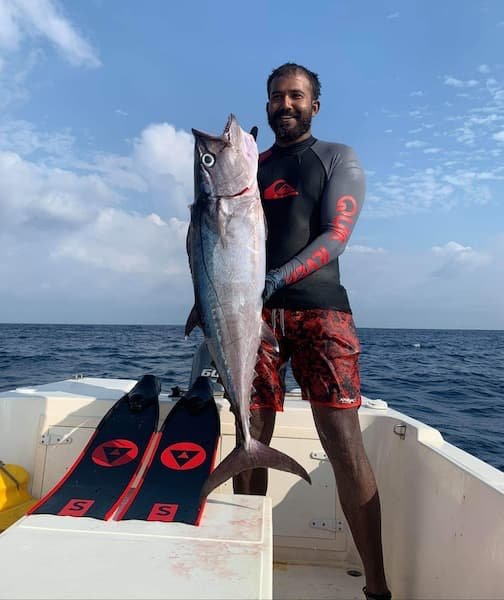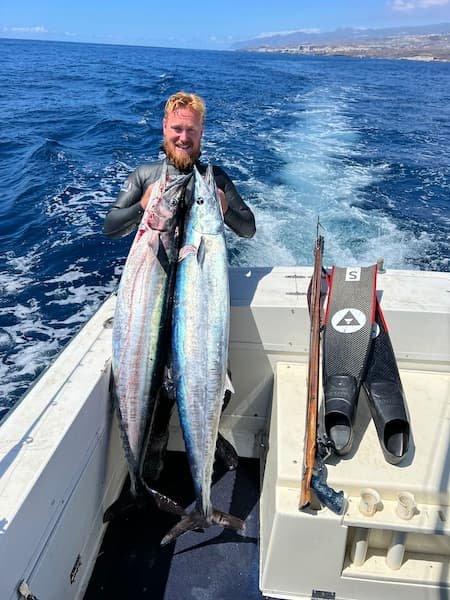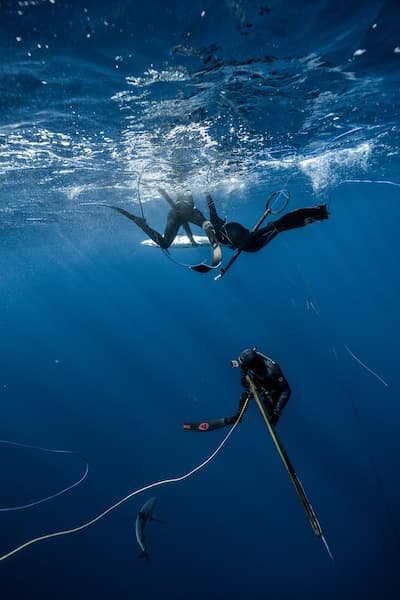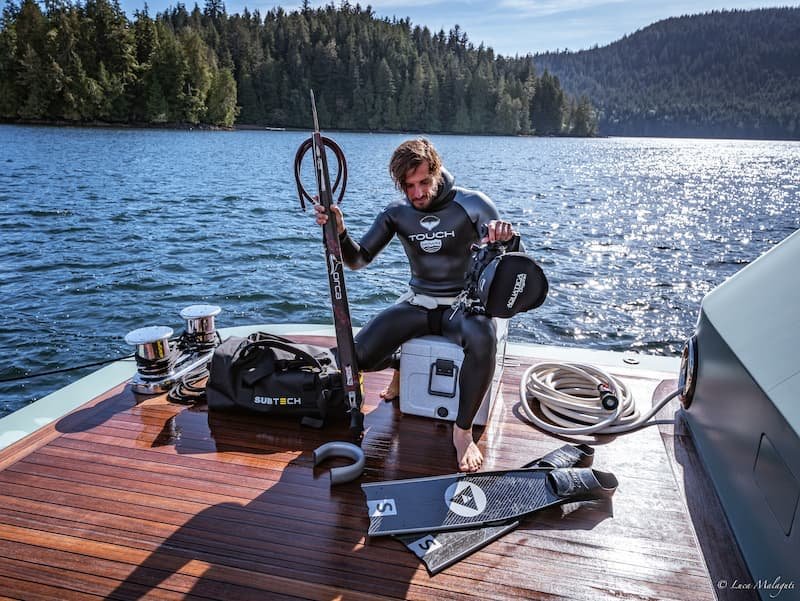
 Roni Essex
Freediver, Spearo, Creator
Roni Essex
Freediver, Spearo, Creator

 Roni Essex
Freediver, Spearo, Creator
Roni Essex
Freediver, Spearo, Creator
Spearfishing isn’t just about catching fish. To ensure that every dive is not only successful but also sustainable and enjoyable for everyone involved, adhering to proper etiquette is essential. Here’s a comprehensive guide to the principles of spearfishing etiquette that every diver should uphold.
Respecting marine life and ecosystems is the cornerstone of responsible spearfishing. It embodies a deep understanding of the interconnectedness of marine habitats and the importance of maintaining their health for future generations. Here’s an expanded look at what this respect entails:
Selective Targeting and Responsible Harvesting: Spearfishers play a crucial role in maintaining sustainable fish populations. Selective targeting involves choosing fish species that are abundant and suitable for consumption, while respecting legal size limits and local regulations. This practice ensures that fish populations can replenish themselves naturally without overexploitation. Responsible harvesting goes beyond simply catching fish. It involves making informed decisions about which fish to target based on their abundance and ecological role. Some fish species, such as apex predators or those critical to ecosystem balance, should be avoided or handled with extreme care due to their significance in maintaining the health of their habitats.
Minimizing Environmental Impact: Spearfishers must be mindful of their impact on marine environments. Avoiding overfishing in specific areas helps prevent depletion of fish stocks and allows ecosystems to recover and thrive. This includes understanding the seasonal movements and breeding patterns of fish species to avoid disturbing critical life stages. Careful navigation and movement underwater can prevent damage to sensitive habitats like coral reefs, seagrass beds, and kelp forests. These ecosystems provide essential habitats and food sources for countless marine species, making their preservation paramount to the overall health of oceanic ecosystems.
Respect for Endangered and Protected Species: Certain fish species are protected due to their endangered status or ecological importance. Spearfishers must educate themselves about local endangered species and strictly adhere to regulations prohibiting their capture. Even accidental encounters with protected species should be reported to relevant authorities to aid in conservation efforts and monitor population trends.
Promoting Sustainable Fishing Practices: Beyond individual actions, spearfishers can contribute to conservation efforts by advocating for sustainable fishing practices within their communities and among fellow divers. This includes promoting catch-and-release practices for non-targeted species, using biodegradable gear where possible, and participating in beach clean-ups and marine conservation initiatives.

Safety is paramount in spearfishing, ensuring not only the enjoyment of the sport but also the well-being of all participants. Spearfishers must prioritize several key aspects to maintain safety in the often challenging and unpredictable underwater environment.
Diving with a buddy is a fundamental safety practice. This ensures that there is always someone nearby to provide assistance in case of emergencies, such as equipment malfunctions, unexpected currents, or medical issues like shallow water blackout. Buddies act as crucial support systems, allowing for quicker responses to any unforeseen circumstances that may arise during the dive.
Knowing and respecting personal limits is equally essential. Spearfishers should be acutely aware of their own physical capabilities, diving experience, and comfort levels underwater. Overestimating one's abilities or diving beyond personal limits can lead to exhaustion, panic, or injury, jeopardizing both personal safety and that of the diving team.
Clear and effective communication underwater is another critical safety measure. Using standardized hand signals and communication techniques allows divers to convey important information quickly and efficiently, even in challenging visibility conditions. This communication ensures coordinated dives, helps prevent accidents, and facilitates prompt responses to any emergent situations that may arise.
Spearfishers should also be well-prepared with appropriate safety gear. This includes wearing a properly fitting wetsuit and mask, ensuring the snorkel is securely attached, and having a reliable dive knife or shears readily accessible. These tools can aid in quickly freeing oneself from entanglements or cutting through fishing line if necessary, reducing the risk of accidents underwater.
Staying updated on local weather conditions and potential hazards in the dive area is essential for proactive safety management. Changes in weather, water temperature, and currents can significantly impact diving conditions. Being informed allows spearfishers to make informed decisions about when and where to dive, ensuring safer and more enjoyable experiences in the water.

Respecting fellow divers and other water users is essential in creating a harmonious and safe environment during spearfishing expeditions. This respect extends beyond mere courtesy; it fosters camaraderie, enhances safety, and contributes to the overall enjoyment of everyone sharing the aquatic space.
Firstly, it's important to give adequate space to other divers and fishermen. Crowding around popular dive sites can lead to accidents and disrupt the concentration needed for successful spearfishing. By maintaining a respectful distance, divers not only avoid interfering with each other's activities but also reduce the risk of entanglements and collisions underwater.
Being aware of the movements and activities of others in the vicinity is crucial. This awareness helps spearfishers anticipate potential interactions and adjust their own diving behaviors accordingly. It's common practice to communicate intentions clearly through hand signals or verbal cues, ensuring that everyone understands each other's movements and objectives underwater.
Sharing local knowledge and tips about dive sites in a constructive manner can greatly benefit the diving community. Whether it's pointing out ideal entry points, discussing prevailing currents, or highlighting potential hazards, sharing information helps everyone navigate the underwater terrain safely and effectively.
Lastly, fostering a sense of community and mutual support among divers is essential. This can be achieved through participating in group activities like beach clean-ups, marine conservation initiatives, or local diving clubs. By working together to protect and preserve marine environments, divers can build lasting relationships based on shared values and experiences.

Proper care and consideration of gear and equipment are essential aspects of spearfishing etiquette, ensuring safety, efficiency, and respect for the marine environment.
Firstly, securing and maintaining equipment is crucial for safe diving practices. Spearfishers should always ensure that their spearguns, fins, masks, snorkels, and other gear are in good working condition before each dive. This includes checking for any signs of wear, ensuring all connections are secure, and testing equipment functionality in a controlled environment.
Packing and organizing gear properly is also important. This not only helps streamline the preparation process but also reduces the risk of forgetting essential items or damaging equipment during transport. Storing gear in designated compartments or containers keeps everything organized and easily accessible when needed.
When it comes to using gear underwater, spearfishers should exercise caution to minimize their impact on the environment. This includes handling spearguns and other tools with care to avoid unintentional damage to reefs, kelp forests, or other sensitive marine habitats. Properly securing spearguns and knives when not in use prevents accidental release and potential entanglements with marine life.
After each dive, thorough cleaning and maintenance of gear are essential practices. Rinsing equipment with fresh water helps remove salt, sand, and debris that can corrode or degrade materials over time. Drying gear thoroughly before storage prevents mold and mildew buildup, extending the lifespan of equipment and ensuring it remains in optimal condition for future dives.
Spearfishers should also be mindful of their environmental footprint when selecting and using gear. Opting for eco-friendly materials, such as biodegradable fishing lines and lead-free weights, minimizes pollution and reduces harm to marine life. Additionally, supporting brands and manufacturers committed to sustainability promotes responsible consumption within the diving community.
Lastly, proper disposal of old or damaged gear is important for environmental conservation. Recycling materials whenever possible and disposing of hazardous substances, such as batteries or chemical cleaners, responsibly prevents pollution and protects marine ecosystems from harmful contaminants.

Continuous education and advocacy are vital components of responsible spearfishing, enabling divers to stay informed, promote sustainability, and contribute to marine conservation efforts.
Education begins with understanding local regulations and guidelines governing spearfishing activities. Divers should familiarize themselves with seasonal closures, catch limits, and protected species to ensure compliance and minimize negative impacts on marine ecosystems. Keeping abreast of current research and scientific findings regarding marine biodiversity and habitat conservation further enhances knowledge and informs responsible diving practices.
Engaging in organized efforts, such as joining conservation organizations or participating in community outreach programs, amplifies advocacy efforts. Spearfishers can collaborate with scientists, policymakers, and environmental groups to support marine protection initiatives, lobby for stronger regulations, and raise awareness about threats facing ocean ecosystems. This collective action strengthens conservation efforts and promotes sustainable management practices that benefit both marine life and recreational divers.
Continuous education also involves refining diving skills and techniques through advanced training courses and workshops. Improving proficiency in breath-holding, diving depths, and underwater navigation not only enhances safety but also allows divers to explore and enjoy marine environments responsibly. By investing in ongoing education and skill development, spearfishers demonstrate a commitment to personal growth and environmental stewardship.
Ultimately, spearfishers play a pivotal role as stewards of the ocean, advocating for sustainable practices and preserving marine biodiversity for future generations. Through continuous learning, proactive advocacy, and responsible action, divers contribute to the longevity and health of our marine ecosystems, ensuring that the beauty and diversity of underwater habitats endure for years to come.